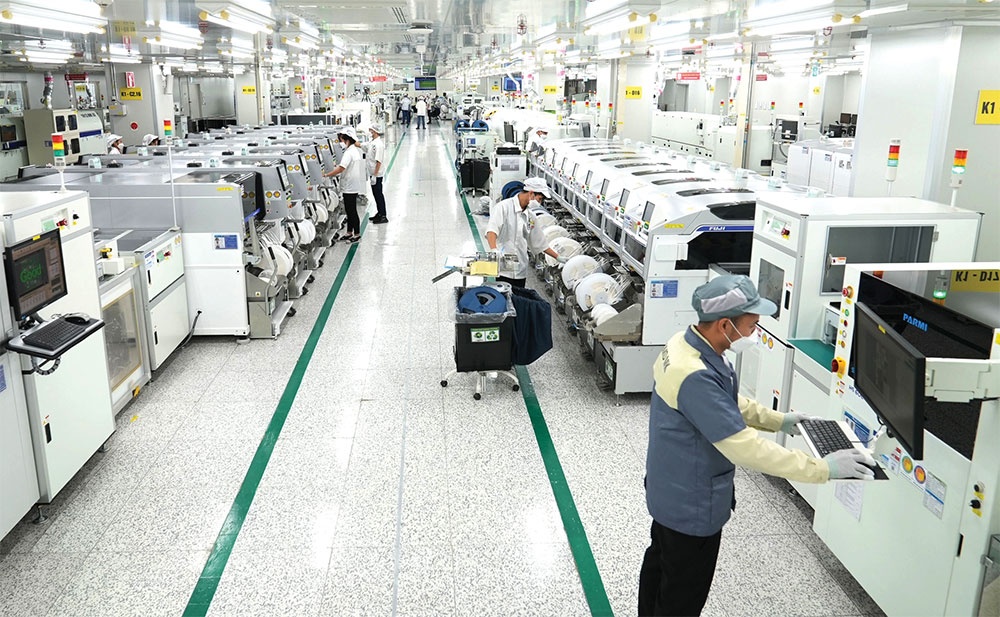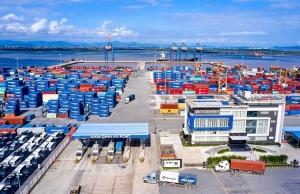Clock ticks to shape response to global corporate tax policy
Starting in 2024, when the South Korean government will impose the global minimum corporate income tax (GMT), Samsung estimates that it will be required to pay an additional $400 million in taxes to South Korea. Taking into account the tax incentive period in Vietnam, the total tax difference this group must pay is estimated to be $6.5 billion, according to data released by Samsung Vietnam last month.
 |
| Clock ticks to shape response to global corporate tax policy, photo Thuy Linh |
Companies like Samsung are believed to be anxious that the enactment of GMT next year will exacerbate the company’s obstacles, as profits are declining and competition for semiconductor technology is intensifying.
According to the Ministry of Finance, Vietnam has approximately 335 projects with registered capital exceeding $100 million, with a focus on the high-tech industry, including Samsung, Intel, LG, Bosch, Sharp, Panasonic, Foxconn, and Pegatron.
The total registered investment for these categories of initiatives accounts for approximately 30 per cent of the total foreign direct investment (FDI) in Vietnam (approximately $131.3 billion).
As per analysts, the implementation of the GMT in 2024 will have an instantaneous impact on Vietnam’s business climate and system of preferential policies. However, there is the potential to collect at least $512 million annually if this tax is legislated. The average income tax rate on multinational corporations is currently approximately 12.3 per cent.
Le Thi Huyen Trang, director of Research and Consulting at JLL Vietnam, said the GMT policy does not impact the production plans of existing foreign-led projects; it only affects decisions regarding new and expanded investment in Vietnam.
According to Trang, Vietnam still has time to find solutions to this levy. She believes that Vietnam’s strategic location provides it with certain advantages and that the country’s labour and demographic indicators are still balanced.
She cited research from Fulbright University to assert that there will be only a 3-5 year deficit in education if the government does not increase its efforts.
“It will be challenging for Vietnam to draw in new FDI,” Trang warned. “It is now more important than ever to enhance the quality of infrastructure, investment procedures, and human resources. It could take Vietnam 15-20 years to transform a generation of human resources.”
Improving labour capacity is a way for Vietnam to attract FDI without using low-cost labour and tax incentives, Trang explained. According to JLL, Vietnam’s prices are currently more competitive than China’s, but investors also consider Vietnam’s production capacity in addition to labour costs.
Michele Wee, CEO of Standard Chartered Bank (Vietnam), remarked that the government has continuously implemented policies that are transparent and open to criticism, continually fostering FDI in the nation, and this remains unchanged.
“Now we must examine the Vietnamese government’s intentions in terms of high growth, high income, high technology, and to becoming a regional treasury centre, to be investment grade, to be an emerging market, and to be net-zero,” said Wee.
All of these indicate that the authorities are going to promote all FDI that advances these national strategies.
Wee added that government policies must be highly adaptable and strategic in order to accommodate emerging market trends.
“Free trade agreements can be strengthened and expanded to attract both FDI and boost domestic growth,” she said. “The government will come across an appropriate approach and harmony among global tax and local incentives to assist institutions in managing the forthcoming GMT.”
| The Organisation for Economic Cooperation and Development established the global minimum tax which 142 nations, including Vietnam, are expected to implement. With this tax, all multinational corporations with a revenue of at least approximately $815 million will be required to pay a tax rate of 15 per cent. |
 | Vietnam must revisit policies to develop implementation of global minimum tax Countries that have outbound and inbound investment activities have been making drastic moves in considering policies related to the global minimum tax (GMT). If Vietnam does not take immediate action or delays implementing it, it may miss the opportunity to have the right to tax and may be left behind in attracting foreign investment. |
 | Vietnam adjusting policies to adapt to global minimum corporate income tax: Official Vietnam is studying and adjusting its investment policies to adapt to the global minimum corporate income tax which is scheduled to be applied from 2024, said Deputy Minister of Planning and Investment Nguyen Thi Bich Ngoc. |
 | Global minimum tax to see IP investors demand quality As the global minimum tax becomes widely implemented, competition for foreign direct investment (FDI) will become more dependent on the quality and services given to investors. |
What the stars mean:
★ Poor ★ ★ Promising ★★★ Good ★★★★ Very good ★★★★★ Exceptional
 Tag:
Tag:
Related Contents
Latest News
More News
- Private capital funds as cornerstone of IFC plans (February 20, 2026 | 14:38)
- Priorities for building credibility and momentum within Vietnamese IFCs (February 20, 2026 | 14:29)
- How Hong Kong can bridge critical financial centre gaps (February 20, 2026 | 14:22)
- All global experiences useful for Vietnam’s international financial hub (February 20, 2026 | 14:16)
- Raised ties reaffirm strategic trust (February 20, 2026 | 14:06)
- Sustained growth can translate into income gains (February 19, 2026 | 18:55)
- The vision to maintain a stable monetary policy (February 19, 2026 | 08:50)
- Banking sector faces data governance hurdles in AI transition (February 19, 2026 | 08:00)
- AI leading to shift in banking roles (February 18, 2026 | 19:54)
- Digital banking enters season of transformation (February 16, 2026 | 09:00)





















 Mobile Version
Mobile Version